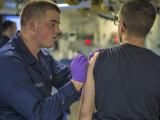Feb 13, 2003 (CIDRAP News) – Two men have had encephalitis and one contracted myocarditis after getting smallpox shots in the US military vaccination program, but all three have recovered, a Department of Defense (DoD) vaccine expert said today.
In addition, seven cases of generalized vaccinia have occurred among the more than 100,000 service members vaccinated so far, said Col John Grabenstein, RPh, PhD, deputy director for military vaccines in the Army Surgeon General's Office.
"The key point is that even our most severe cases have had full recoveries and are back to work," Grabenstein told the Institute of Medicine's Committee on Smallpox Vaccination Program Implementation. The committee met in Washington, DC, in a session made accessible through a live webcast.
DoD revealed Jan 31 that one solider had contracted encephalitis after being vaccinated. "This is the first public announcement of the second case," Grabenstein said
One solider became ill with encephalitis after he was sent from Georgia to an overseas post. He was hospitalized in Germany and is now back at work, Grabenstein reported. A second man contracted encephalitis in the United States, was hospitalized for several days, and has been released, Grabenstein said, adding, "He will probably make his deployment overseas on schedule."
One of the encephalitis patients had been vaccinated previously and one had not, Grabenstein noted.
The man who had myocarditis, also stationed in the United States, was admitted to a hospital with chest pain and was discharged 2 days later with full recovery, Grabenstein said.
Earlier in the meeting, Kathleen Toomey, MD, director of Georgia's Division of Public Health, said she understood that a vaccinated military member from Georgia had had to be put on a ventilator because of severe encephalitis. Grabenstein didn't comment on that report or offer any details of the treatments given the encephalitis patients.
He said it is likely, though not certain, that the cases were related to the vaccine. "Almost all of the things [complications] we see are in the window from day 8 to day 12 [after vaccination], so it's circumstantial but more likely than not due to the vaccine," he said in discussing the encephalitis and myocarditis cases.
He told the committee there have been seven cases of rash that met the program's definition of generalized vaccinia. "They were all treated as outpatients, all stayed on the job, all stayed with their units; the only time they lost was clinic visit time," he said.
"Since the middle of December we've vaccinated over 8,000 healthcare workers and well over 100,000 combat personnel, and the emphasis in that phrase is on the 'well over' part," he said. "My key message to you is well over 100,000 successful vaccinations." About 63% of those vaccinated had not had a smallpox shot before, he said. "So the notion that we're going to protect the public by vaccinating previous vaccinees is not particularly borne out."
Grabenstein said anywhere from 10% to 40% of military personnel, depending on the location, have been exempted from vaccination because of contraindications that would make the shot risky for themselves or their close contacts. The higher rates have been at sites where many personnel live with people who have contraindications, he said. "The folks in the barracks and the folks overseas in theaters without family members are almost completely vaccinated."
He reported that vaccine "take" rates have been high. Workers at one vaccination site called him and reported that they are getting "only" a 91% take rate, but they were able to increase the rate after trying a few recommended steps, he said.
DoD has seen no cases of vaccinia transmission from vaccinees to others, but one person suffered an eye infection through autoinoculation, he reported. No patients have needed treatment with vaccinia immune globulin.
As DoD reported previously, about 3% of vaccinees have had to miss an average of 1 1/2 days of work because of such common side effects as fever, rash, malaise, or swollen lymph nodes, he told the committee.
"We are seeing a rash of rashes, something on the order of a dozen per thousand or so," Grabenstein said. Vacinees "are treated symptomatically and sent back to work."
He said emergency department workers who see a recent vaccinee with a rash often conclude wrongly that it's generalized vaccinia. "Flat rashes are not vaccinia," which involves vesicles or pustules, he said. Once workers have seen a few cases, they learn to make the distinction, he said.
No one has refused to get a smallpox shot, and morale among those being vaccinated is high, he told the panel. "People know they have a job to do and to a great extent appreciate what we're doing."
In response to a committee question, Grabenstein said DoD is not requiring women to get a pregnancy test before being vaccinated. They are asked if they are pregnant and told that pregnancy tests are available, he said.
One of the most common questions from military personnel is whether they can have sex after getting the shot, Grabenstein reported. "So that's a specific question and answer in the brochure for family members. The answer is, 'Wear a T-shirt,'" he said, drawing a laugh.


















